m (→Resources: external link) |
(layout) |
||
| (102 intermediate revisions by 9 users not shown) | |||
| Line 1: | Line 1: | ||
[[File:West Seattle Tool Library's Community Workshop.jpg|thumb|The Fixers Collective At The West [[Seattle]] Tool Library's Community Workshop, March 2012, Attribution: jpdunn]] | |||
* UK Sharing Libraries Network: Strengthening a Movement, Jan 24, 2022...<ref>[https://networkofwellbeing.org/2022/01/24/uk-sharing-libraries-network-strengthening-a-movement/ networkofwellbeing.org]</ref> | |||
{{ | |||
{{Read more|Sharing news}} | |||
'''Sharing''' is a basic component of human interaction, and is responsible for strengthening social ties and ensuring a person’s well-being.<ref>[[wikipedia:Sharing]]</ref> It can also be seen as a way of building a sense of community particularly via the process of sharing [[food]], but also by a variety of other activities such as [[ridesharing]] or [[co-housing]]. It can be argued that sharing strengthens the resilience of local economies. Sharing programs have even be divised for whole [[:category:Cities|cities]]. | |||
== Community action projects == | |||
* Cohousing schemes | * Cohousing schemes | ||
| Line 18: | Line 22: | ||
* skill sharing events or programmes | * skill sharing events or programmes | ||
* support land rights movements | * support land rights movements | ||
* Dec 1 - 24: Reverse advent calendars eg see [https://www.bbc.co.uk/news/uk-42069381 bbc.co.uk/news] | |||
== Events == | |||
{{Eventlist|location=world|keyword=sharing|year=2024}} | |||
== BookCrossing == | |||
[[File:ZSP Bookcrossing in UW 2012.JPG|290px|thumb|Bookcrossing bookcase at the University of Warsaw, organized by the Association of Polish Students]] | |||
BookCrossing (also BC, BCing or BXing) is defined as "the practice of leaving a book in a public place to be picked up and read by others, who then do likewise." The term is derived from bookcrossing.com, a free online book club which was founded to encourage the practice, aiming to "make the whole world a library." | |||
The 'crossing' or exchanging of books may take any of a number of forms, including wild-releasing books in public, direct swaps with other members of the websites, or "book rings" in which books travel in a set order to participants who want to read a certain book. The community aspect of BookCrossing.com has grown and expanded in ways that were not expected at the outset, in the form of blog or forum discussions, mailing lists and annual conventions throughout the world. {{W|BookCrossing}} <br clear=right> | |||
== Little Free Library == | |||
[[File:Little Free Library, Easthampton MA.jpg|290px|right|Little Free Library, Easthampton [[Massachusetts]]]] | |||
''Main article'': [[Mini library]] | |||
Little Free Libraries are a community movement in the United States and worldwide that offers free books housed in small containers to members of the local community. They are also referred to as community book exchanges, book trading posts, pop-up libraries, and Noox (Neighbourhood bOOk eXchange), amongst other terms. {{W|Little Free Library}} | |||
'''External links''' | |||
* [https://littlefreelibrary.org/ Little Free Library]<br clear=right> | |||
== Cohousing == | |||
{{Excerpt|Cohousing}} | |||
== Potluck == | |||
[[File:Potluck06.jpg|290px|thumb|An assortment of food dishes at a church potluck]] | |||
A potluck is a gathering of people where each person or group of people contributes a dish of food prepared by the person or the group, to be shared among the larger gathered group. Synonyms include: potluck dinner, spread, Jacob's join, Jacob's supper, faith supper, covered dish supper, dish party, bring and share, shared lunch, pitch-in, carry-in, bring-a-plate, dish-to-pass, fuddle. It is also referred to as a smorgasbord or potlatch. {{W|Potluck}} <br clear=right> | |||
== Streetbank == | |||
The Streetbank website states "Streetbank is a movement of people who share with their neighbours". | |||
The purpose of Streetbank is to boost local communities by encouraging people to get to know their neighbours. {{W|Streetbank}} / [https://www.streetbank.com StreetBank] | |||
== Tool libraries == | |||
Tool libraries allow patrons to borrow tools, equipment and "how-to" instructional materials, functioning either as a rental shop, with a charge for borrowing the tools, or more commonly free of charge as a form of community sharing. Given their increasing popularity and proven history of success, tool libraries and tool banks are now playing an exciting role in the burgeoning sharing economy and can be found everywhere from local public libraries to makerspaces. {{W|List of tool-lending libraries}} | |||
== Resources == | |||
=== Networks === | |||
[https://www.shareable.net/sharing-cities Sharing Cities network], Shareable | |||
=== Apps for sustainability === | |||
[https://olioex.com/ OLIO] | |||
=== Books === | |||
* Sharing Cities: A worldwide cities overview on platform economy policies with a focus on [[Barcelona]] [https://www.share.barcelona:80/book/ share.barcelona] | |||
=== Funding === | |||
16 Tips to Crowdfund a Tool Library In Your Town, July 2015 [https://www.shareable.net/blog/16-tips-to-crowdfund-a-tool-library-in-your-town Shareable] | |||
=== How to's === | |||
* How to set up a swap or free store, [https://www.shareable.net/blog/how-to-set-up-a-swap-or-free-store Shareable], Dec 10, 2018 | |||
* [[How to start a tool library in your community]] | |||
* How to Organize a ShareFest, [https://www.shareable.net/blog/how-to-organize-a-sharefest Shareable], February 17, 2014 | |||
* How to start a Library of Things, [https://www.shareable.net/blog/how-to-start-a-library-of-things Shareable] | |||
=== Maps === | |||
[https://www.shareable.net/sharing-cities Sharing Cities network], Shareable | |||
=== Research === | |||
Made to Measure, [https://www.participatorycity.org/made-to-measure-1 Participatory City], Year 1 Report for the EVERY ONE EVERY DAY initiative | |||
=== Video === | |||
{{Video|-OmulYTaoY8}} | |||
=== Other resources === | |||
* 8 tips on hosting a successful clothing swap [https://www.shareable.net/blog/8-tips-on-hosting-a-successful-clothing-swap Shareable], Nov 30, 2018 | |||
* The Ultimate Guide To Organizing a Skillshare, [http://web.archive.org/web/20160416142330/http://www.shareable.net/blog/the-ultimate-guide-to-organizing-a-skillshare Shareable] | |||
* Sharing Cities: Activating the Urban Commons, [https://www.shareable.net/sharing-cities Shareable] | |||
* A Guide To Sharing For Every Season, [https://www.shareable.net/blog/a-guide-to-sharing-for-every-season Shareable], January 10, 2012 | |||
* [https://sharingvoucher.com/ Sharing Vouchers] | |||
* Top 10 Ways to Save Money through Sharing, [https://www.shareable.net/blog/top-10-ways-to-save-money-through-sharing Shareable], September 3, 2010 | |||
* ''see also'' [[United States#Sharing]] | |||
* Wikipedia: [[Wikipedia:List of tool-lending libraries|List of tool-lending libraries]] | |||
== Commons == | == Commons == | ||
The traditional idea of a | ''Main article:'' [[Commons]] | ||
The traditional idea of a commons allows for sharing within a community. Customs and laws enabled the commons to be protected. | |||
:The commons is a general term referring to the cultural and natural resources accessible to all members of a society, including natural materials such as air, water, and a habitable earth. These resources are held in common, not owned privately. | :The commons is a general term referring to the cultural and natural resources accessible to all members of a society, including natural materials such as air, water, and a habitable earth. These resources are held in common, not owned privately. | ||
| Line 32: | Line 130: | ||
:Caring for the commons is an act of individual stewardship (long-term care for a given resource for the benefit of oneself and others including the resource itself) and collective trusteeship. It is the very essence of being ‘whole’, the fundamental basis of interdisciplinarity. It is one of the few ways we have to acknowledge our debt to the past generations, and to embody our link to future generation. It shows we believe in ourselves as an enduring civilization, not an economy. | :Caring for the commons is an act of individual stewardship (long-term care for a given resource for the benefit of oneself and others including the resource itself) and collective trusteeship. It is the very essence of being ‘whole’, the fundamental basis of interdisciplinarity. It is one of the few ways we have to acknowledge our debt to the past generations, and to embody our link to future generation. It shows we believe in ourselves as an enduring civilization, not an economy. | ||
:Caring for the commons means more than just regulating. Caretakers are needed, that is, a system nurturing societal cooperation, sharing of goods and thoughtfulness of generations to come. It entails establishing norms that reduce free riding and hold communities together. For our generation seems to be moving beyond viewing commons only as a norm, and taking action to enable and protect them in all spheres of our lives. | :Caring for the commons means more than just regulating. Caretakers are needed, that is, a system nurturing societal cooperation, sharing of goods and thoughtfulness of generations to come. It entails establishing norms that reduce free riding and hold communities together. For our generation seems to be moving beyond viewing commons only as a norm, and taking action to enable and protect them in all spheres of our lives. {{W|Commons}} | ||
== Sharing economy == | == Sharing economy == | ||
Sharing economy is an umbrella term with a range of meanings, often used to describe economic and social activity involving online transactions. Originally growing out of the open-source community to refer to peer-to-peer based sharing of access to goods and services, the term is now sometimes used in a broader sense to describe any sales transactions that are done via online market places, even ones that are business to business (B2B), rather than peer-to-peer. For this reason, the term sharing economy has been criticised as misleading, some arguing that even services that enable peer-to-peer exchange can be primarily profit-driven. {{W|Sharing economy}} In the case of "ride sharing" companies like Uber and Lyft, it is arguable that little to nothing is being shared, the cars belong to the drivers (who have to pay for their upkeep out of pocket), and the organizational structure is centralized instead of peer-to-peer. | |||
=== Mesh economy === | === Mesh economy === | ||
| Line 52: | Line 146: | ||
== Sharing cities == | == Sharing cities == | ||
{{ | {{Video|6WVFTBK-MTY}} | ||
=== Sharing cities community maps === | |||
[https://www.shareable.net/community-maps Shareable] | |||
'''See also''': | |||
* [[:Category:Sharing cities]] | |||
* Seoul, [[South Korea]] | |||
* [[11 core principles for Sharing Cities]] | |||
'''External links''': | |||
[https://www.shareable.net/sharing-cities Sharing Cities network], Shareable | |||
Sharing City Lab, founded by the two cities Seoul and Amsterdam | |||
=== | == See also == | ||
* [[Sharing news]] | |||
* | * [[Sharing UK]] | ||
* [[Community currencies, sustainable community action]] | * [[Community currencies, sustainable community action]] | ||
* [[Community resources]] | * [[Community resources]] | ||
* [[Ethical consumerism]] | * [[Ethical consumerism]] | ||
* [[Food | * [[Food activism]] | ||
* [[Free stuff]] | * [[Free stuff]] | ||
* [[Localism]] | * [[Localism]] | ||
* [[Mini library]] | * [[Mini library]] | ||
* [[Networks]] | |||
* [[Reduce, reuse, repair and recycle]] | * [[Reduce, reuse, repair and recycle]] | ||
* [[Ride sharing]] | * [[Ride sharing]] | ||
* [[Sustainable transport | * [[Sustainable transport activism]] | ||
* [[Towards sustainable economies]] | * [[Towards sustainable economies]] | ||
* [[Urban sustainability]] | |||
* [[:category:Commons|Commons]] (category) | * [[:category:Commons|Commons]] (category) | ||
* [[:Category:Sharing|Sharing]] (category) | |||
{{Localtopic}} | |||
{{CASwiki menu}} | |||
'''External links''' | |||
[ | * Wikipedia: [[Wikipedia:Sharing|Sharing]], [[Wikipedia:Sharing economy|Sharing economy]], [[Wikipedia:Collaborative consumption|Collaborative consumption]], [[Wikipedia:Sharing#In computer and Internet culture|Online sharing]], [[Wikipedia:Temporary work|Temporary work]], [[Wikipedia:Category:Land rights movements|Land rights movements]] (category), Library of Things {{W|Library of Things}} | ||
[https://sharewiki.org/en/Main_Page Sharewiki], a wiki about sharing. | |||
* [https://www.bewelcome.org/ BeWelcome], describes itself as an "open-source, independent network, built by volunteers." | |||
* [https://www.bookcrossing.com/ BookCrossing] | |||
* [https://yunity.org/en yunity] | |||
* [https://grist.org/series/the-real-sharing-economy/ The Real Sharing Economy] Series From [[Grist Magazine]] On The Sharing Economy | |||
'''References''' | |||
<references /> | |||
{{Page data}} | |||
[[Category:Sharing]] | |||
[[Category:Sustainable community action topics]] | |||
Latest revision as of 09:25, 26 March 2024
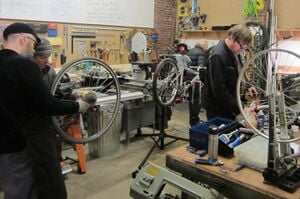
- UK Sharing Libraries Network: Strengthening a Movement, Jan 24, 2022...[1]
Sharing is a basic component of human interaction, and is responsible for strengthening social ties and ensuring a person’s well-being.[2] It can also be seen as a way of building a sense of community particularly via the process of sharing food, but also by a variety of other activities such as ridesharing or co-housing. It can be argued that sharing strengthens the resilience of local economies. Sharing programs have even be divised for whole cities.
Community action projects[edit | edit source]
- Cohousing schemes
- develop a ShareFest or similar annual event
- encourage equipment sharing and develop tool & all other kinds of community resource libraries
- help build the digital commons, for example share information and knowledge on CASwiki and Appropedia
- hold a potluck, bring and share food (or other stuff) events
- little free libraries or Mini library
- organise co-purchasing clubs
- promote collaborative consumption
- set up toy libraries
- set up community book exchanges, promote book crossing
- set up co-working spaces
- skill sharing events or programmes
- support land rights movements
- Dec 1 - 24: Reverse advent calendars eg see bbc.co.uk/news
Events[edit | edit source]
 Jan 01, 2024 (Mon) — Public Domain Day
Jan 01, 2024 (Mon) — Public Domain Day Sep 15, 2024 (Sun) — Free Money Day
Sep 15, 2024 (Sun) — Free Money Day
BookCrossing[edit | edit source]
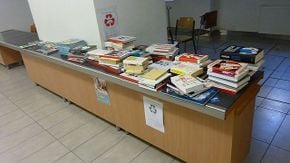
BookCrossing (also BC, BCing or BXing) is defined as "the practice of leaving a book in a public place to be picked up and read by others, who then do likewise." The term is derived from bookcrossing.com, a free online book club which was founded to encourage the practice, aiming to "make the whole world a library."
The 'crossing' or exchanging of books may take any of a number of forms, including wild-releasing books in public, direct swaps with other members of the websites, or "book rings" in which books travel in a set order to participants who want to read a certain book. The community aspect of BookCrossing.com has grown and expanded in ways that were not expected at the outset, in the form of blog or forum discussions, mailing lists and annual conventions throughout the world. W
Little Free Library[edit | edit source]
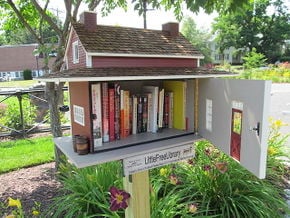
Main article: Mini library
Little Free Libraries are a community movement in the United States and worldwide that offers free books housed in small containers to members of the local community. They are also referred to as community book exchanges, book trading posts, pop-up libraries, and Noox (Neighbourhood bOOk eXchange), amongst other terms. W
External links
Cohousing[edit | edit source]
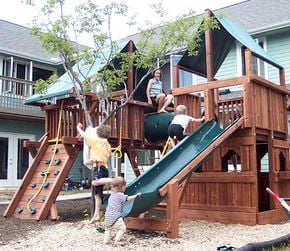
 A model for senior living? London’s commune for older women, positive.news (Jun 14, 2023)
A model for senior living? London’s commune for older women, positive.news (Jun 14, 2023)
Cohousing is a way of sharing resources and space, and allowing for greater community and collaboration, while still giving individuals their own private space - though less private space is needed than in conventional, isolated housing.
Potluck[edit | edit source]
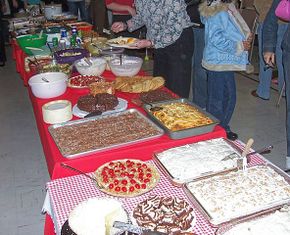
A potluck is a gathering of people where each person or group of people contributes a dish of food prepared by the person or the group, to be shared among the larger gathered group. Synonyms include: potluck dinner, spread, Jacob's join, Jacob's supper, faith supper, covered dish supper, dish party, bring and share, shared lunch, pitch-in, carry-in, bring-a-plate, dish-to-pass, fuddle. It is also referred to as a smorgasbord or potlatch. W
Streetbank[edit | edit source]
The Streetbank website states "Streetbank is a movement of people who share with their neighbours".
The purpose of Streetbank is to boost local communities by encouraging people to get to know their neighbours. W / StreetBank
Tool libraries[edit | edit source]
Tool libraries allow patrons to borrow tools, equipment and "how-to" instructional materials, functioning either as a rental shop, with a charge for borrowing the tools, or more commonly free of charge as a form of community sharing. Given their increasing popularity and proven history of success, tool libraries and tool banks are now playing an exciting role in the burgeoning sharing economy and can be found everywhere from local public libraries to makerspaces. W
Resources[edit | edit source]
Networks[edit | edit source]
Sharing Cities network, Shareable
Apps for sustainability[edit | edit source]
Books[edit | edit source]
- Sharing Cities: A worldwide cities overview on platform economy policies with a focus on Barcelona share.barcelona
Funding[edit | edit source]
16 Tips to Crowdfund a Tool Library In Your Town, July 2015 Shareable
How to's[edit | edit source]
- How to set up a swap or free store, Shareable, Dec 10, 2018
- How to start a tool library in your community
- How to Organize a ShareFest, Shareable, February 17, 2014
- How to start a Library of Things, Shareable
Maps[edit | edit source]
Sharing Cities network, Shareable
Research[edit | edit source]
Made to Measure, Participatory City, Year 1 Report for the EVERY ONE EVERY DAY initiative
Video[edit | edit source]
Other resources[edit | edit source]
- 8 tips on hosting a successful clothing swap Shareable, Nov 30, 2018
- The Ultimate Guide To Organizing a Skillshare, Shareable
- Sharing Cities: Activating the Urban Commons, Shareable
- A Guide To Sharing For Every Season, Shareable, January 10, 2012
- Sharing Vouchers
- Top 10 Ways to Save Money through Sharing, Shareable, September 3, 2010
- see also United States#Sharing
- Wikipedia: List of tool-lending libraries
Commons[edit | edit source]
Main article: Commons
The traditional idea of a commons allows for sharing within a community. Customs and laws enabled the commons to be protected.
- The commons is a general term referring to the cultural and natural resources accessible to all members of a society, including natural materials such as air, water, and a habitable earth. These resources are held in common, not owned privately.
- Today, the commons are also understood within a cultural sphere. These commons include literature, music, arts, design, film, video, television, radio, information, software and sites of heritage. The crowdsourcing movement and among others Wikipedia are examples of the production and maintenance of common goods by certain communities in the form or videos, music, or encyclopedic knowledge that can be freely accessed by anyone without a central authority. Tragedy in the Wiki-Commons is avoided among others by community control and trading status and attention of individual authors within the Wikipedia community.
- Stewardship
- Caring for the commons is an act of individual stewardship (long-term care for a given resource for the benefit of oneself and others including the resource itself) and collective trusteeship. It is the very essence of being ‘whole’, the fundamental basis of interdisciplinarity. It is one of the few ways we have to acknowledge our debt to the past generations, and to embody our link to future generation. It shows we believe in ourselves as an enduring civilization, not an economy.
- Caring for the commons means more than just regulating. Caretakers are needed, that is, a system nurturing societal cooperation, sharing of goods and thoughtfulness of generations to come. It entails establishing norms that reduce free riding and hold communities together. For our generation seems to be moving beyond viewing commons only as a norm, and taking action to enable and protect them in all spheres of our lives. W
Sharing economy[edit | edit source]
Sharing economy is an umbrella term with a range of meanings, often used to describe economic and social activity involving online transactions. Originally growing out of the open-source community to refer to peer-to-peer based sharing of access to goods and services, the term is now sometimes used in a broader sense to describe any sales transactions that are done via online market places, even ones that are business to business (B2B), rather than peer-to-peer. For this reason, the term sharing economy has been criticised as misleading, some arguing that even services that enable peer-to-peer exchange can be primarily profit-driven. W In the case of "ride sharing" companies like Uber and Lyft, it is arguable that little to nothing is being shared, the cars belong to the drivers (who have to pay for their upkeep out of pocket), and the organizational structure is centralized instead of peer-to-peer.
Mesh economy[edit | edit source]
The Mesh economy encompasses public and private sector organizations and firms working within the various realms of the sharing economy, the peer economy, the collaborative economy and the circular economy. The shift from defining unused value as waste to defining it as an opportunity to create value from more efficient resource use is the common factor among all mesh economy organizations. The understanding that information technology enables excess capacity in human capital to be more efficiently deployed to solve social and environmental challenges as articulated by Clay Shirky in his 2008 book, Here Comes Everybody: The Power of Organizing Without Organizations is an important influence. W
Government-mediated sharing[edit | edit source]
Public goods such as public transport and public open space are typically provided by a government using tax funds. This enables the provision of common goods and services which (due to the free rider problemW are not easily provided for by individuals or civil society).
Sharing cities[edit | edit source]
Sharing cities community maps[edit | edit source]
See also:
External links:
Sharing Cities network, Shareable
Sharing City Lab, founded by the two cities Seoul and Amsterdam
See also[edit | edit source]
- Sharing news
- Sharing UK
- Community currencies, sustainable community action
- Community resources
- Ethical consumerism
- Food activism
- Free stuff
- Localism
- Mini library
- Networks
- Reduce, reuse, repair and recycle
- Ride sharing
- Sustainable transport activism
- Towards sustainable economies
- Urban sustainability
- Commons (category)
- Sharing (category)
local information can be found, or shared, via our many location pages
External links
- Wikipedia: Sharing, Sharing economy, Collaborative consumption, Online sharing, Temporary work, Land rights movements (category), Library of Things W
Sharewiki, a wiki about sharing.
- BeWelcome, describes itself as an "open-source, independent network, built by volunteers."
- BookCrossing
- yunity
- The Real Sharing Economy Series From Grist Magazine On The Sharing Economy
References

